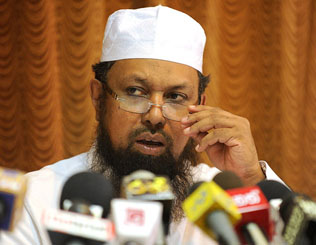MMDA Reforms: Ulema Insists Women Must Play Second Fiddle
 All Ceylon Jamiyyathul Ulema (ACJU) in its latest submission to the Muslim Personal Law Reforms Committee Chaired by Former
All Ceylon Jamiyyathul Ulema (ACJU) in its latest submission to the Muslim Personal Law Reforms Committee Chaired by Former
The new 37 page document, outlines the position of the ACJU with regard to the proposed changes, all of which have been rejected on the grounds of non-conformity with Sharia.
The ACJU is an unelected body with its head Mufthi Rizwe holding the post of chairman for over a decade. The submission by the ACJU renounces all theological and interpretational advances made in Islamic jurisprudence and instead used pre medieval comprehension to assert its view, again.
Rizwe in repeated Jumma sermons had insisted that females should wear the Nikab and has been a strong opponent of any reform to the MMDA Insisting on ideals such as marriage at the age of 6 being permissible.
Rejecting the need to introduce females as Quazi’s (judges) into the Quazi Court System, the ACJU is of the view that as per all major Islamic schools of thought “it is not permissible for a woman to be appointed as a judge, and if she is appointed, the one who appointed her is sinning, and her appointment is invalid, and her judgements carry no weight, no matter what ruling she passes.”
They further quote the hadith “No people will ever prosper who appoint a woman in charge of their affairs,” which according to the ACJU “is general in meaning and applies to all positions of public authority. So it is not permissible to appoint a woman, because the word ‘affairs’ is general in meaning and includes all the public affairs of the Muslims.”
Rejecting the appointment of females to be appointed as marriage registrars, the ACJU expresses that the appointment of a woman would lead to compromise on important “shari’ah concerns” since marriages are recommended to be held at Mosques and are conducted in the presence of males. The document does not specify the “Shari’ah aspects”. The document further notes that in the case of a marriage happening outside a mosque “the traveling of women alone, the mingling of women with non-mahram men and processing the registration will no doubt have practical and Shari’ah concerns.” A Mahram male is one who falls within the prohibited degrees of marriage for a woman as per Islam.
Further, according to these submissions, for a valid marriage to happen, Islam requires four people, none of which includes the bride herself. The four accordingly are the guardian of the bride referred to as the wali (usually father, uncle, or brother of the bride), the bridegroom, and two Muslim male witnesses who are familiar with the two contracting parties.
Unlike the rest of the country where the bride herself signs her marriage form signifying consent, the MMDA requires the guardian of the bride to sign for and on behalf of her. Women’s groups have been demanding for the right to be given to the bride herself, however, the ACJU in its document recommends the brides signature in addition to her guardians signature stating “in no circumstance it should indicate that without the consent of Wali, a bride on her own free will, can proceed with her marriage”.
The requirement is in line with pre medieval practices in which women were betrothed by men who believed they were chattel of men.
The ACJU further notes “the father is generally the Wali of the bride, and he may marry her off without her consent, if she is a virgin, provided certain conditions are met. It is, however, Mustahab (
The MMDA unlike the General Marriage Law of the Country does not recognize 18 as the minimum age of marriage. Under the MMDA a girl below 12 years can be wedded off with the authorization of the Quazi. This practice has been criticized at various forums for not being in line with international standards. The ACJU in their submissions recommends the minimum age to be raised to 18, however lays out that approval should be obtained from a Quazi for marriages between age 16-18. It further states that marriage below 16 if occurred, should not be invalidated under the MMDA. Thereby stating that the status quo of child marriage should remain intact.
Rejecting that limitations should be placed on entering into polygamous marriages the ACJU opines that a proper reading of the Quranic verses on polygamy permits the practice without exceptions of circumstance. The ACJU sees no reason to place restrictions on such practice “due to few unfortunate situations that arise in polygamous marriages”. Some Muslim countries have banned this practice as outdated and women’s groups have been lobbying for the same in Sri Lanka.


